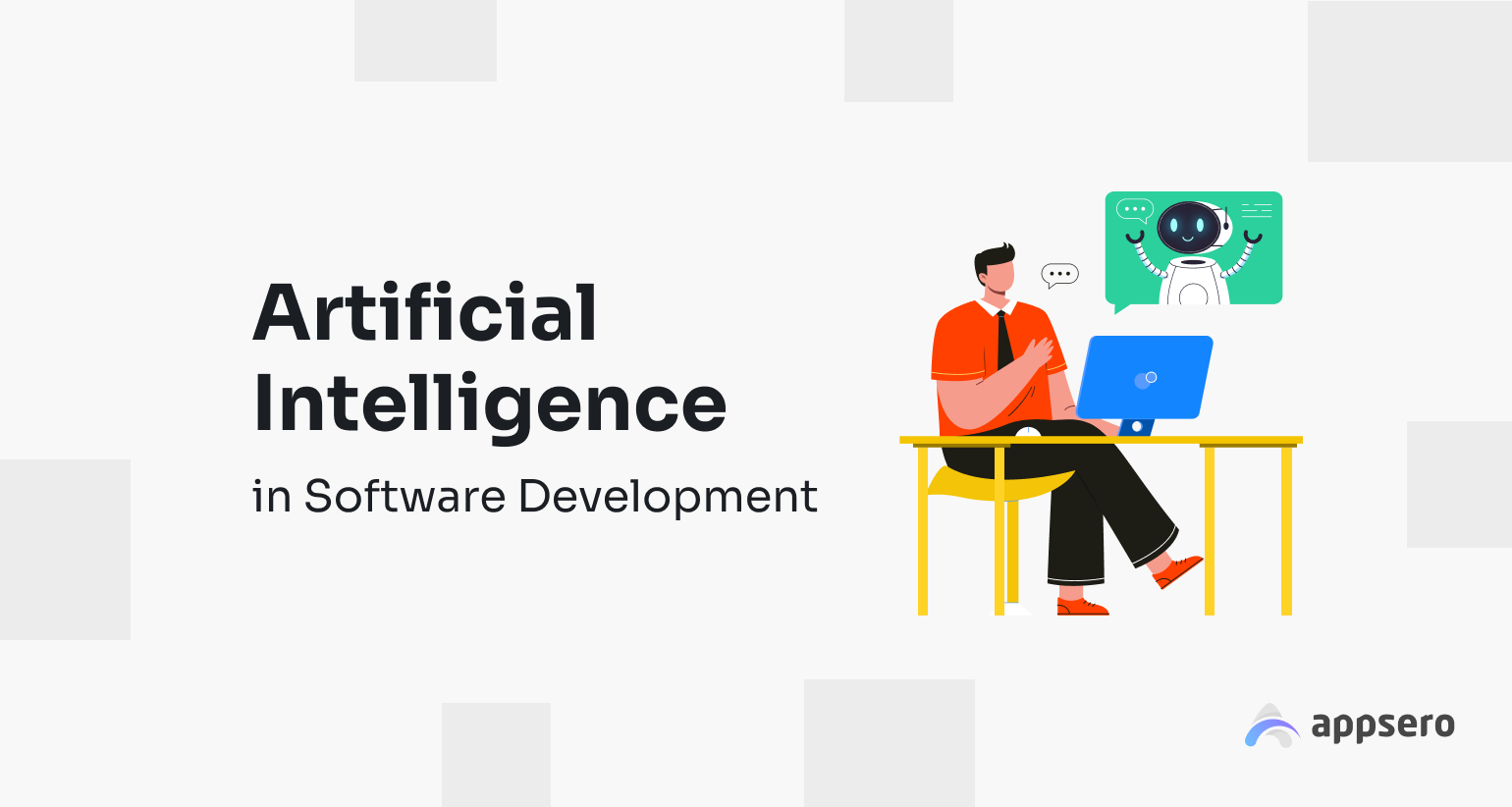
The Future of AI in Software Development
The emergence of AI was never the center of attraction on the web before 2022. The arrival of ChatGPT has taken the internet by storm. It has transformed the way we interact with machines and has brought about significant changes in various industries. And, people from all professions started using it effectively.
One of the areas where AI is having a profound impact is software development. Software developers are more prone to use AI-powered tools to maximize productivity and minimize errors.
As we move forward, the role of AI in software development is expected to grow even more significantly. In this article, we will explore the future of AI in software development and the impact it is likely to have on the industry.
We will also discuss the potential benefits of AI for developers and how it can help them to create more intelligent, efficient, and effective software systems. First, let’s know what artificial intelligence aka AI is.
What is Artificial Intelligence?
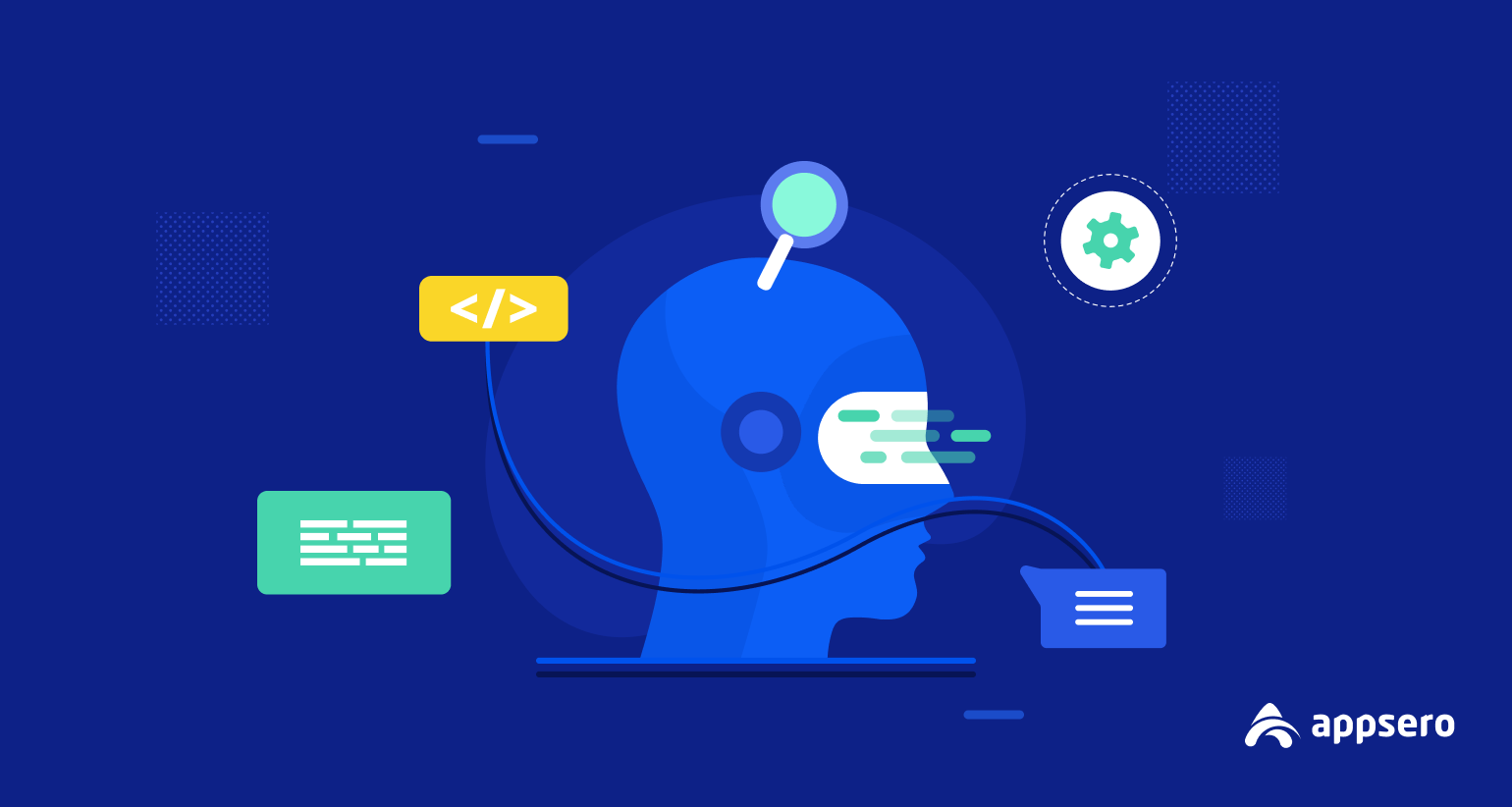
Artificial Intelligence (AI) refers to the development of computer systems and algorithms that can perform tasks that typically require human intelligence. Visual perception, speech recognition, decision-making, interaction in a conversational way, and language translation are a few things an AI system can do. AI works by utilizing a combination of techniques such as
- Machine learning
- Deep learning
- Natural language processing (NLP)
- Robotics
to process and analyze data, identify patterns, and make decisions. AI systems can be designed to learn and improve over time, which allows them to adapt to new situations and improve their performance.
ChatGPT is an example of this model. It is constantly improving as it processes new data and user interactions, making it a powerful tool for natural language processing and communication.
Let’s learn what AI is from the best. John McCarthy, who was a legendary computer scientist and a professor of Computer Science at Stanford University gave the following definition of AI in 2004.
It is the science and engineering of making intelligent machines, especially intelligent computer programs. It is related to the similar task of using computers to understand human intelligence, but AI does not have to confine itself to methods that are biologically observable.
(John McCarthy, 2004)
Though AI was first coined in the 1950s, it got deserved attention in the last couple of years. Let’s know what is the current state of AI.
The current state of AI and top trends
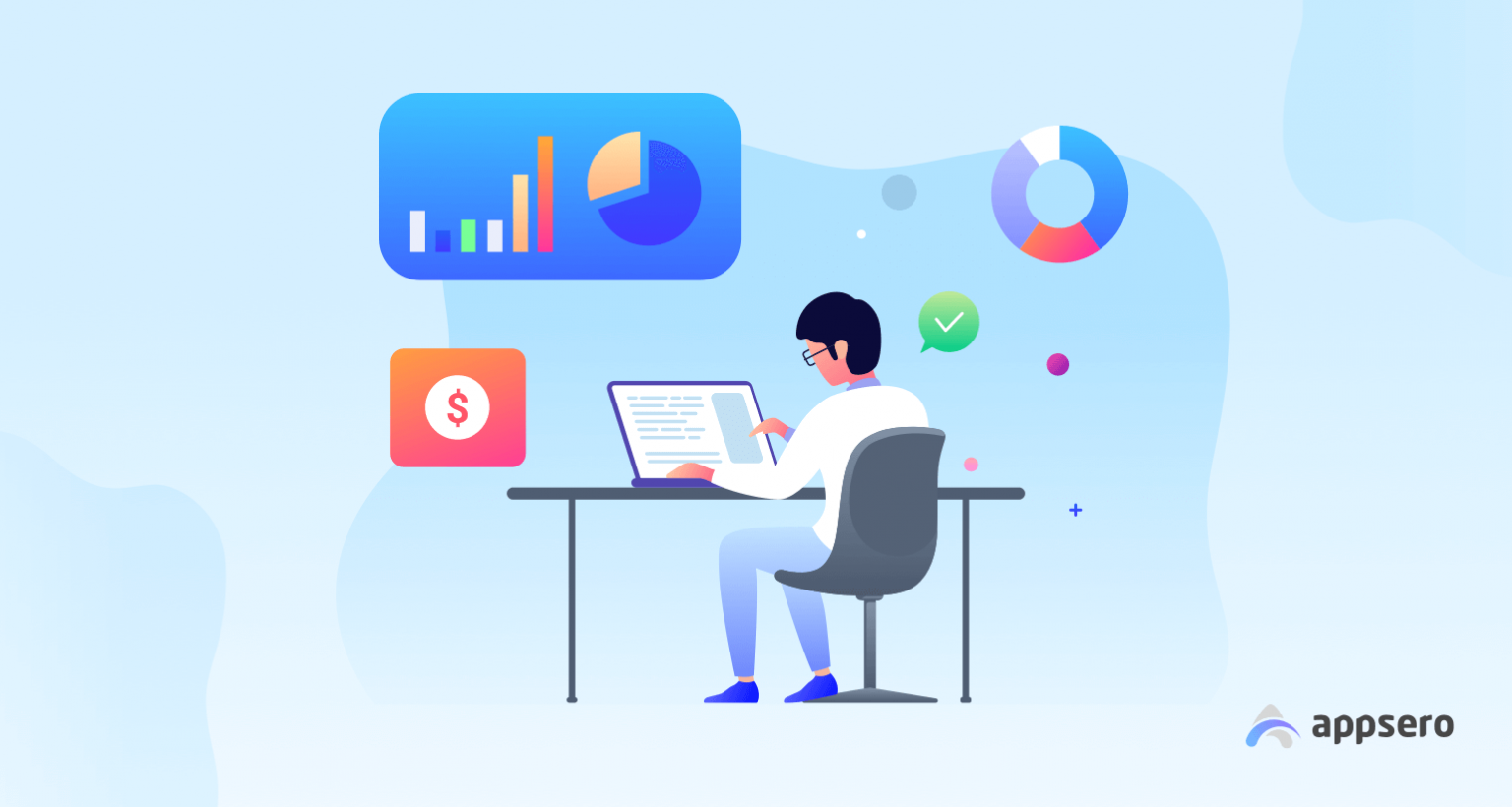
According to research conducted by McKinsey, the adoption of AI technologies more than doubled since 2017. And the usage of AI is ever-increasing at a significant rate. Tech giants like Microsoft and Google are investing a hefty amount of money in the AI sector.
Undoubtedly, the future of AI is bright. We need to wait a few years more to see the extent and ability of AI to its fullest potential. Judging from the happenings in present years, here are a few AI trends we have discussed to help you know the current state of AI.
1. AI is now accessible to everyone
Even a couple of years back, the AI field was solely dominated by big companies like IBM, Amazon, Google, Microsoft, and more. Research and development related to AI were so complex and expensive that smaller companies couldn’t afford to participate in the development of AI technology.
But the open-sourcing of generative models and natural language processing models made AI accessible to everyone. As a result, rapid democratization is happening in the AI industry. Every company regardless of its size can access the amazing services of AI now.
2. GPT AI will get more commercialized
Based on current trends and developments in the field, we can conclude that GPT (Generative Pre-trained Transformer) AI will become more commercialized. Since these models can generate human-like text, answer questions, summarize information, and even translate languages, they have a wide range of potential applications in industries such as marketing, customer service, journalism, and more.
Many companies are already exploring the use of GPT AI models to improve their products and services. For example, chatbots powered by GPT AI can provide personalized customer support and enhance user engagement. Additionally, you can use GPT AI to automate content creation for social media, emails, and other marketing materials.
As GPT AI technology continues to improve and become more accessible, it is likely that more companies will adopt it for commercial purposes. However, it is important to note that the ethical and societal implications of AI must also be considered.
Three sources briefed on OpenAI’s recent pitch to investors said the organization expects $200 million in revenue next year and $1 billion by 2024.
Reuters, Dec 15, 2022
Moreover, OpenAI already launched a pilot subscription plan for ChatGPT in February 2023. The new subscription plan, ChatGPT Plus, will be available for $20/month, and subscribers will receive a number of additional benefits using the paid plan. So, commercialization already started for GPT AI technology.
3. New regulations will be imposed on the usage of AI
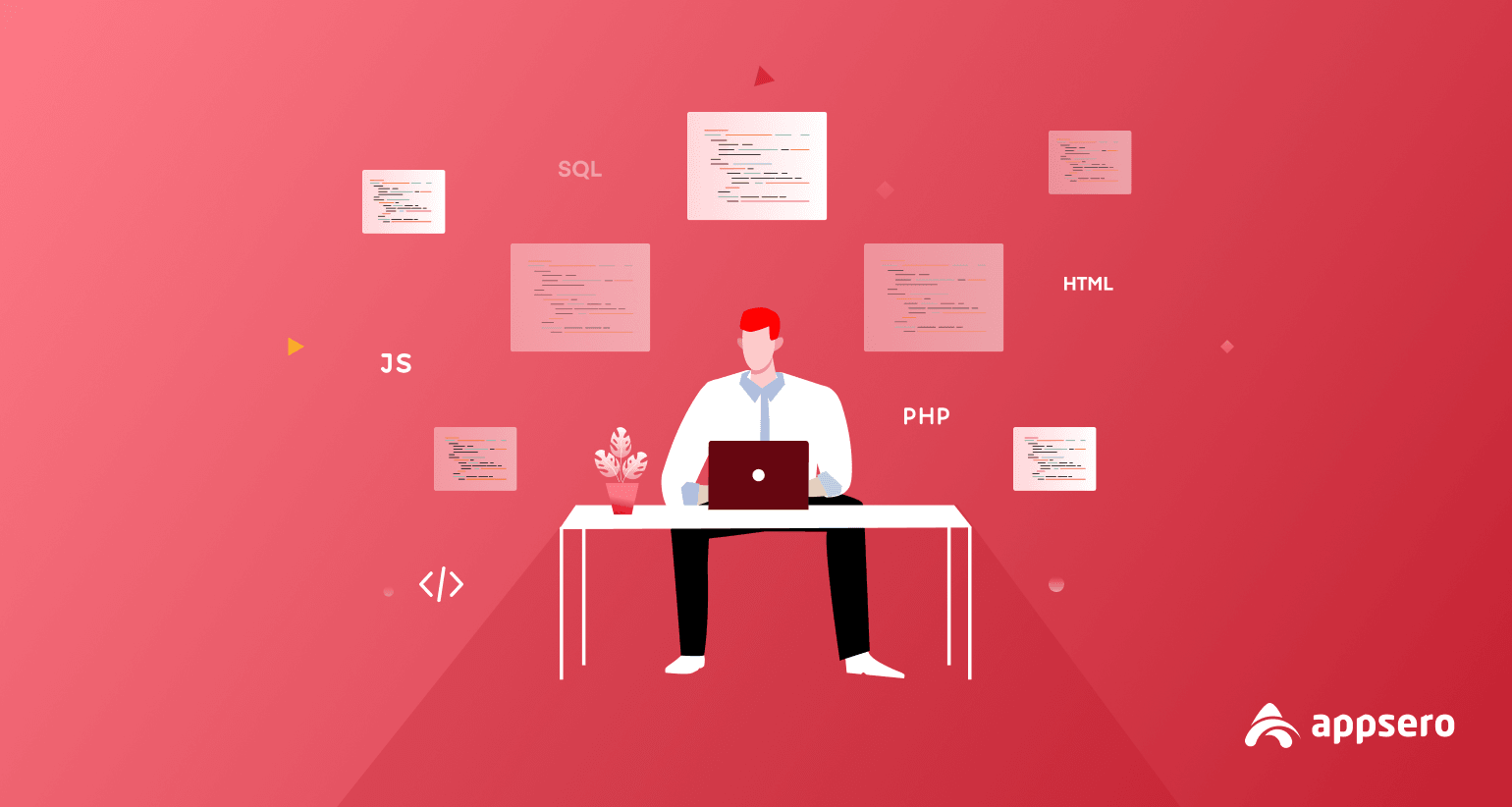
There are no comprehensive laws that specifically control the use of AI. However, there are regulations and guidelines that apply to certain aspects of AI development and use.
Recently, The White House published a Blueprint for an AI Bill of Rights which can be considered the first attempt to control the use of AI. The blueprint comprises the following principles as of now:
- The AI services and systems must be safe and effective for their users.
- You shouldn’t face any sort of discrimination due to the AI algorithms.
- Your data should be protected, and you should have full control over all of your information.
- You should be well informed beforehand that an automated system is in action.
- You should be able to choose an alternative and deny any AI-generated services.
The European Union has strong data protection laws, such as the General Data Protection Regulation (GDPR) that regulate the collection, storage, and processing of personal data. AI systems often rely on large amounts of personal data, so these laws may have implications for the use of AI.
The EU has already proposed an AI Act to control the applications of artificial intelligence. Gradually, more countries will think about regulating the use of AI and keep sharp eyes to determine to what extent AI can be used safely.
4. Humans will collaborate with AI more than ever
Research shows that if humans and machines work collaboratively they perform better than when any of them work alone. In 2023, AI technology is at everyone’s disposal, and people are already using it widely. It’s quite obvious that people and AI will collaborate more than ever in the coming years.
5. AI will replace jobs and create new jobs at the same time
According to the World Economic Forum, AI may replace an estimated 85 million jobs by 2025 and create an estimated 97 million new jobs at the same time. Though some people are reluctant to admit the impact of AI in the job market, the truth is AI will affect many industries. For example, one AI tool along with ten humans may perform tasks equivalent to fifteen humans. In this case, five employees may lose their jobs.
How to use AI in software development

Artificial Intelligence (AI) is a rapidly evolving field that is transforming many industries, including software development. You can use AI in various aspects of software development, from project management and coding to testing and deployment. Here, we will explore some of the ways how you can use AI in software development and explain them in detail.
1. Code generation
Software developers can use AI to generate code automatically. This technique is particularly useful for repetitive tasks, such as creating user interfaces, data models, and boilerplate code. By using AI to generate code, you can save time and focus on more complex tasks that require human creativity.
2. Bug detection
AI can be used to detect bugs and errors in software code. Machine learning algorithms can analyze code and identify potential issues before they cause problems. This technique is effective for large software projects where manual code review can be time-consuming and error-prone.
3. Project management
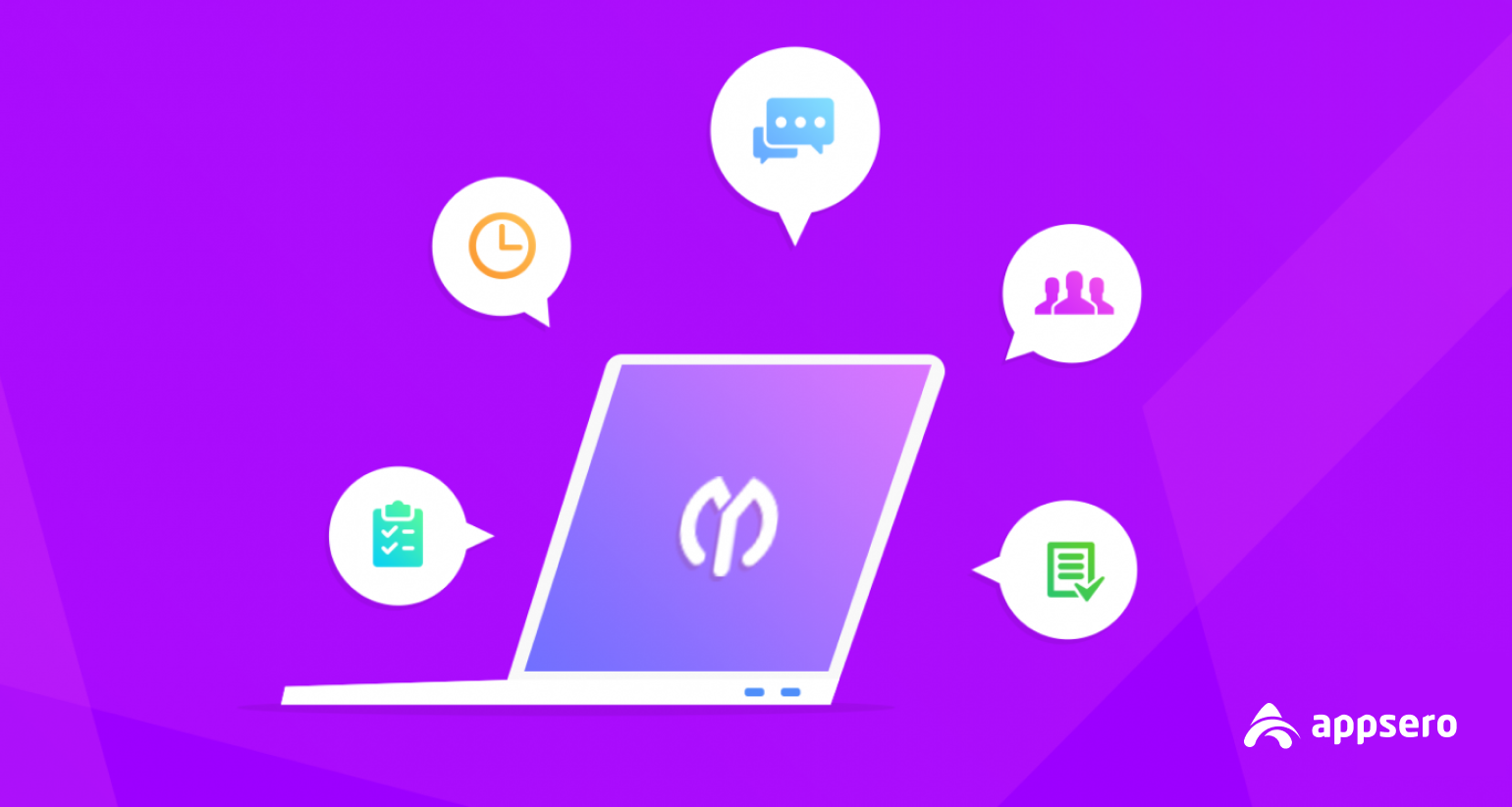
AI comes in handy to optimize project management processes, such as scheduling, resource allocation, and task assignment. By analyzing data on project progress, AI algorithms can identify areas where improvements can be made and help project managers make better decisions.
4. Quality assurance testing
Software quality assurance testing is a critical part of the development process. AI is useful for conducting different types of automation testing. AI algorithms can simulate user interactions and identify potential issues, allowing developers to fix them before releasing the software.
5. Predictive analytics
AI can be used to analyze data and make predictions about future events. In software development, predictive analytics can be used to identify potential issues and prevent them from occurring. For example, AI algorithms can analyze user behavior and predict which features are likely to be popular, allowing developers to focus on those features first.
6. Personalization
Natural language processing (NLP), a branch of AI, can be used to analyze user feedback and improve the software based on user needs and preferences. You can use NLP to analyze and understand natural language, allowing developers to create software that can interact with users more naturally. AI algorithms can tailor the software experience to meet individual user needs and preferences. Thus, AI can be used to personalize software for individual users.
7. Better and quick decision making
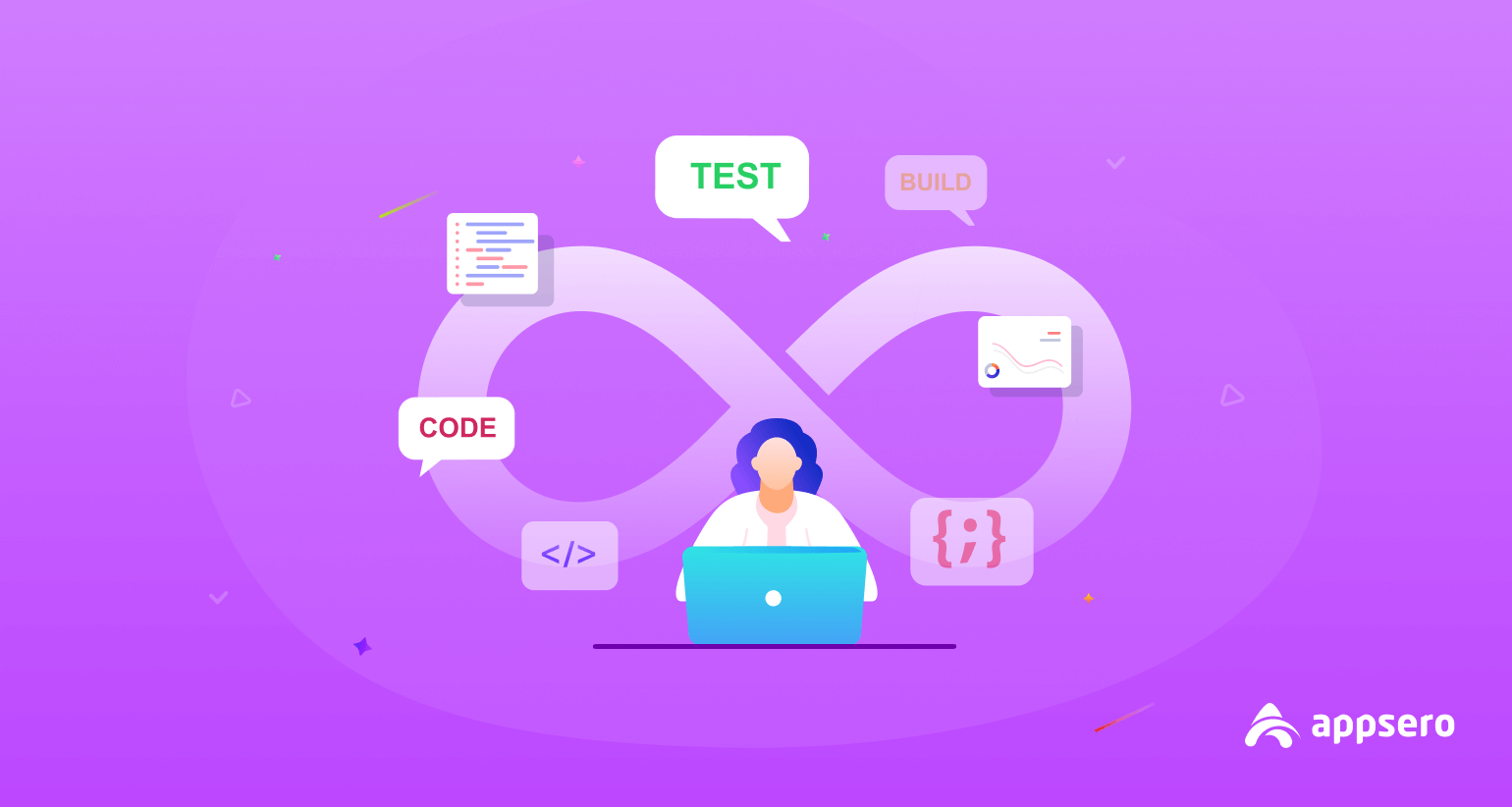
It’s really difficult to analyze data manually to find out which type of software or feature worked well for you in the past. But, AI can quickly analyze trends and usage data to help you with these insights. You can make effective strategic decisions while building software by using AI in the decision-making process.
8. Accurate estimations
This feature of AI tools helps mostly service providers who work for clients. If you’re one of them, you surely have to offer quotes to the clients before getting the projects. On-time delivery is one of the most sought commitments by clients. So, determining the time required for development is a crucial factor here. Artificial intelligence can analyze your projects and their complexities and provide you with an almost accurate estimation of the development time and required resources.
In fine, you can use AI to optimize various aspects of software development, such as testing, code optimization, and automation, to improve software quality and accelerate development processes. Besides, developers can create software that is more efficient, effective, and user-friendly.
As AI technology continues to evolve, it is likely that we will see even more innovative uses of AI in software development in the future. So, embrace this technology to get the benefits of AI in software development.
Challenges of using AI in software development
While AI can offer many benefits for software development, there are also a few challenges that developers face when using AI in the development process. Here are some of the main challenges:
- Data quality and quantity: AI relies heavily on data to learn and improve, and if the data is of poor quality or insufficient, it can negatively impact the accuracy and performance of the AI models.
- Lack of transparency: The complexity of AI models can make it difficult to understand how they arrive at their decisions or recommendations, making it challenging to debug and maintain the software.
- Integration and compatibility: AI tools and frameworks may not always integrate well with existing software development tools, and compatibility issues can arise between different AI technologies.
- Ethical considerations: As AI becomes more prevalent in software development, ethical considerations become increasingly important, including issues related to bias, privacy, and transparency.
- Cost and complexity: Developing and deploying AI-powered software can be expensive and complex, requiring specialized hardware, software, and infrastructure.
- Computational power and resources: AI algorithms require significant computational power and resources, making it challenging for smaller organizations or individuals to develop and deploy effective AI systems.
- Human acceptance and adoption: Finally, AI systems may face resistance from humans who are concerned about the impact of AI on their jobs or on society as a whole.
Moreover, as AI systems become more sophisticated, they may become more vulnerable to cyberattacks. So, you may need to incorporate robust security measures into the software development processes.
Best AI-powered tools for software development
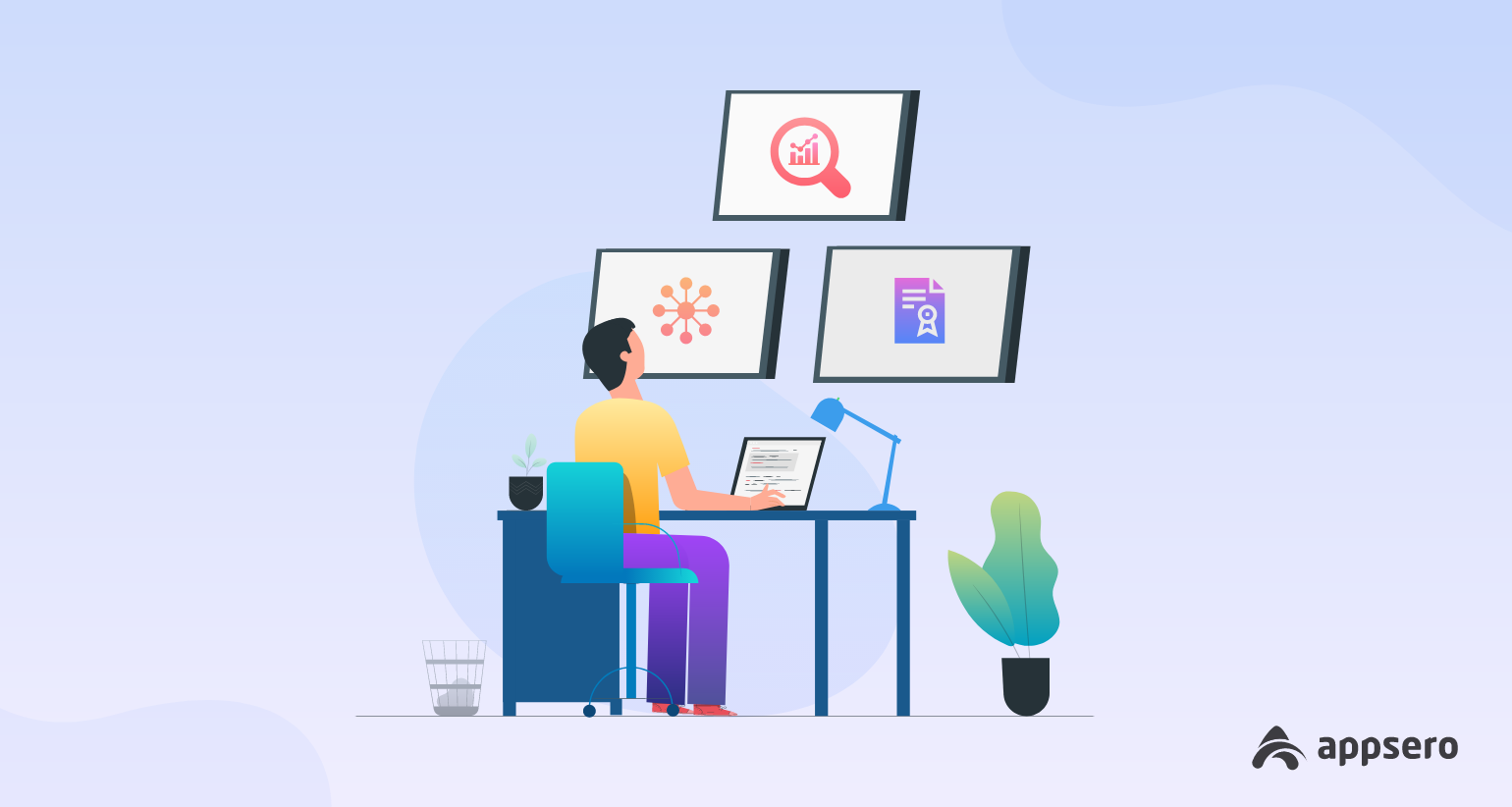
There are many AI-powered tools available for software development, which can help developers to write better code, automate tedious tasks, and improve overall software quality. Some of the popular AI-powered tools for software development are:
- TensorFlow: A popular open-source machine learning framework for developing and deploying deep learning models.
- PyTorch: Another open-source machine learning framework that is widely used for developing and training neural networks.
- Keras: A high-level neural networks API that can run on top of TensorFlow, Theano, or CNTK.
- Scikit-learn: A simple and efficient machine learning library in Python for data mining and data analysis.
- Apache MXNet: A flexible and efficient deep learning framework that supports both imperative and symbolic programming.
- Microsoft Cognitive Toolkit: A deep learning framework that is designed to train and deploy large-scale deep neural networks across multiple GPUs and machines.
- IBM Watson Studio: A cloud-based platform for building, training, and deploying machine learning models using various open-source tools and frameworks.
- H2O.ai: An open-source platform for building and deploying machine learning models that can handle large datasets and support various algorithms.
- Google Cloud AutoML: A suite of machine learning tools that allows you to train custom models without having to write code.
- Amazon SageMaker: A fully-managed platform for building, training, and deploying machine learning models at scale.
Overall, AI-powered tools can help developers to be more productive and efficient, allowing them to focus on more complex tasks and create higher-quality software.
FAQs: The future of AI-driven software development
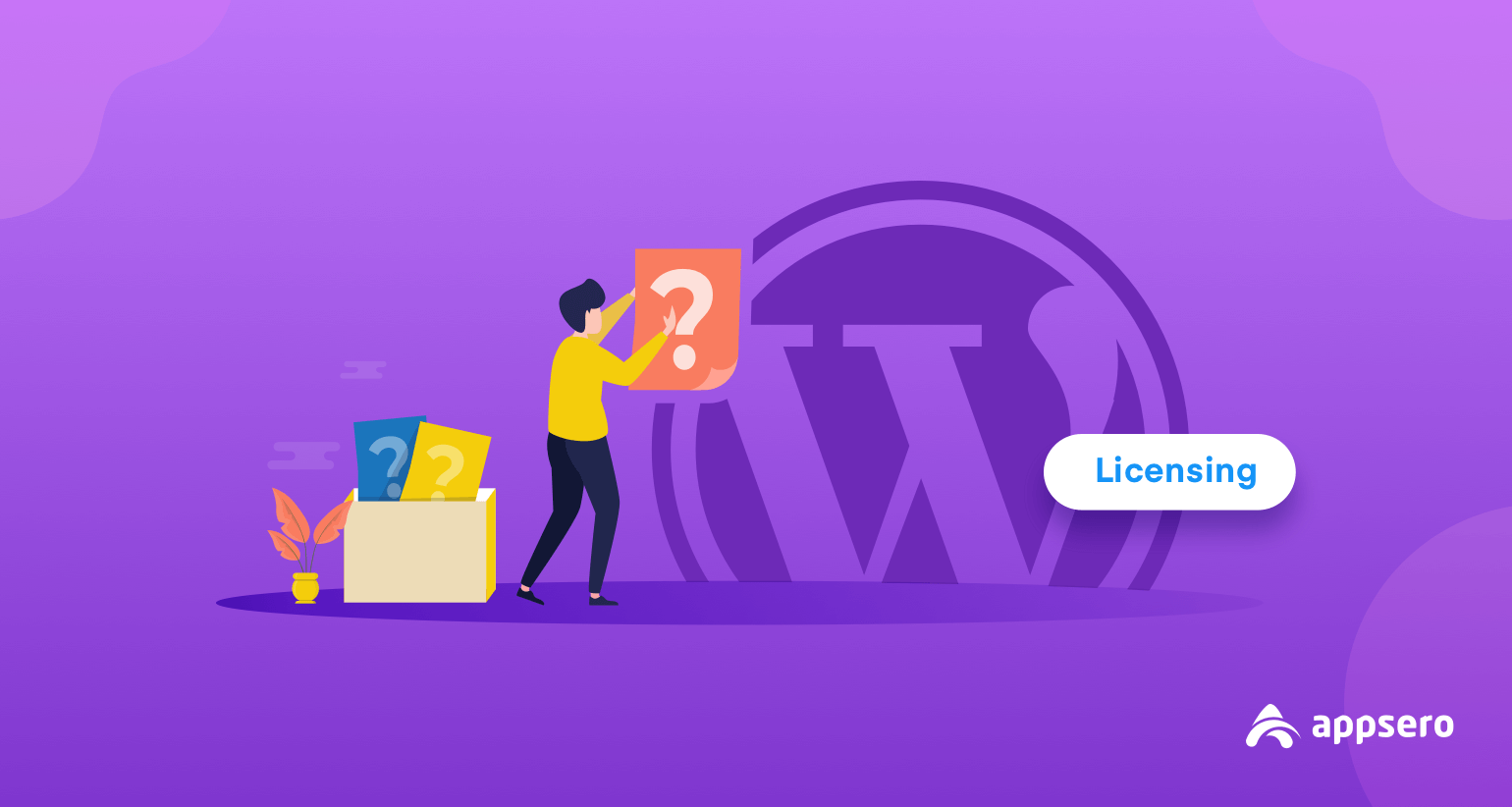
1. Will artificial intelligence take over software development?
It’s highly unlikely that artificial intelligence (AI) will completely take over software development in the near future. While AI is capable of automating many tasks involved in software development, it still lacks the creativity, critical thinking, and decision-making abilities that human developers possess.
Software development is a complex and multi-faceted process that requires a range of skills and knowledge, including problem-solving, communication, and collaboration.
So, human developers will still be needed to provide the creative, critical thinking, and decision-making skills that are essential for successful software development.
2. How can a software developer stay relevant in the face of AI?
As AI continues to transform the software development industry, it’s important for developers to stay up-to-date with the latest trends and technologies in order to remain relevant.
Here are some things you should do as a software developer to stay relevant in the face of AI:
1. Invest time in learning AI technologies such as machine learning, natural language processing, and computer vision.
2. Upskill in related areas such as data science, statistics, and cloud computing.
3. Adopt new tools and processes that leverage AI to automate tasks.
4. Develop soft skills such as communication, collaboration, and problem-solving.
5. Focus on creating software that is intuitive, easy to use, and meets the needs of its target audience.
3. Can a software developer become an AI engineer?
Yes, a software developer can become an AI engineer with the right education, training, and experience. An AI engineer typically requires a strong foundation in computer science, mathematics, and statistics, as well as knowledge of machine learning algorithms and deep learning frameworks.
Software developers who have experience in coding and programming can leverage their skills to become proficient in AI development.
4. How can I get started with AI development?
To get started with AI development, you can start by learning programming languages commonly used in AI development, such as Python, R, and Julia. You can also explore popular AI frameworks and tools, such as TensorFlow, PyTorch, and Keras.
Final thoughts on AI and the future of software development
The future of AI in software development is bright, with many exciting trends and technologies likely to emerge in the years to come. AI and machine learning will play an increasingly important role in software development. They’ll help developers automate routine tasks, identify bugs more quickly, and develop more effective and accurate applications.
At the same time, cloud-based development will become more prevalent, with more companies moving their development and testing environments to the cloud. And, the user experience will continue to be a key focus in software development to build intuitive and user-friendly applications. With the right tools, technologies, and people in place, software developers will be able to create innovative and impactful applications that can help transform industries and improve people’s lives.
Subscribe To Our Newsletter
Don’t miss any updates of our new templates and extensions
and all the astonishing offers we bring for you.



Great insights on how AI is shaping the future of software development! The integration of AI tools is indeed revolutionizing various industries, including the manufacturing sector. For a manufacturing software development company, leveraging AI can streamline processes, enhance productivity, and improve decision-making with predictive analytics. Companies like Dev Technosys are at the forefront of this transformation, offering innovative solutions that cater to industry-specific needs. It’s exciting to see how AI will continue to drive efficiency and innovation in software development across all domains. Keep sharing such valuable perspectives!